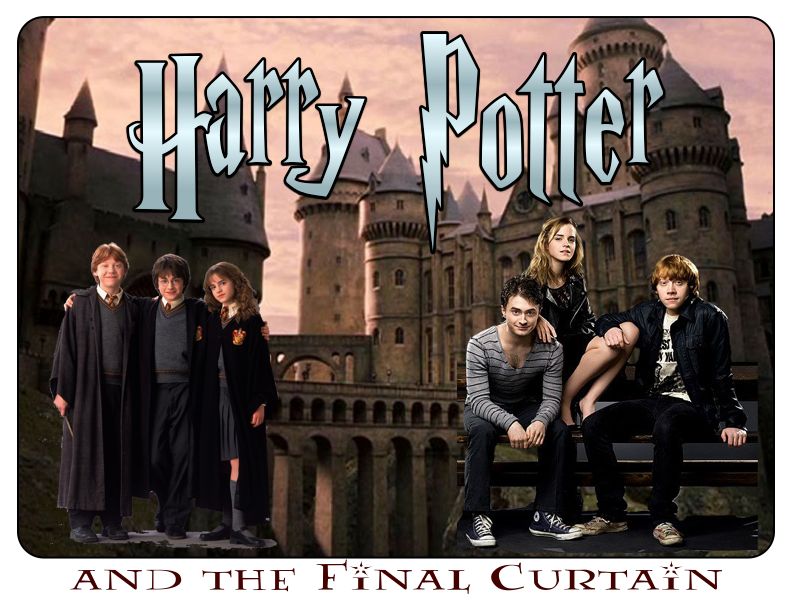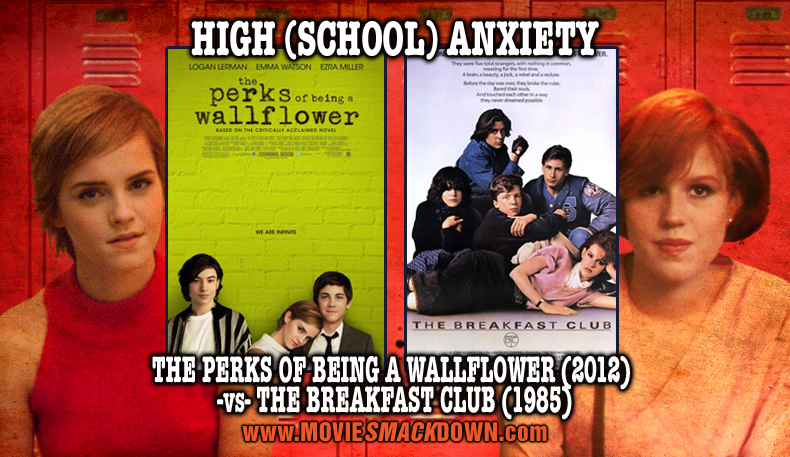
 The Entrancing Hello
The Entrancing Hello
Thirteen years ago, J. K. Rowling captured lightning in a bottle and stamped it across Harry’s forehead as his signature scar.
The success of Harry Potter and the Philosopher’s Stone was unexpected, came out of nowhere, and swept across the world in a feeding frenzy. Momentum gathered, and the first movie, Harry Potter and the Sorcerer’s Stone, was released three short years later. What followed was a phenomenon both the publishing and the film industries will be hard-pressed to duplicate.
This week’s release of Harry Potter and the Deathly Hallows: Part 2 has been ten years in coming, and we’ve journeyed far with the characters. From the first movie to the last, change drove the franchise forward. There was nothing stagnant about the characters or the films.
[singlepic id=1056 w=320 h=240 float=right]
The Characters and Actors
We’ve watched Harry (Daniel Radcliffe) grow from a small, lonely boy, forgotten in a cupboard under the stairs, to a grown man with an enormous inner strength and determination. We watched him gather a family around him where once he had none. With each installment, he became more sure of himself, better able to protect himself and those around him, and more in charge of his own destiny. We shared his heartbreaking losses, his small moments of laughter, and his great triumphs. An ordinary boy became the embodiment of good against unspeakable evil. In the end, the most important thing about Harry was not his determination or his remarkable powers; it was the loyalty others gave him. Without the support of his friends, Harry wouldn’t have made it through the first year, let alone the final confrontation with Voldemort.
Hermione (Emma Watson) first appeared as a snooty know-it-all with an unkempt frizz of hair that must have taken hair and makeup hours of back-combing to accomplish. Insecurities take many forms, and in her case, I think she hid behind her brain. As the stories unfolded, her intelligence often came in handy, but her attitude softened. Laugh if you like, but I believe Hermione’s hair transformed across the movies to reflect the softening and maturing of her character. The moment Hermione glided down the stairs for the Wizard’s Ball in Goblet of Fire, we had to stop thinking of her as a brainy girl and see her for the beautiful, capable adult she was becoming. She was always loyal and smart, but later, her personality was tempered with a kindness and gentleness behind that sharp tongue.
The growth shown by Ron (Rupert Grint) is a little harder to pinpoint, but it’s there. While Harry came from a family who despised him (whenever they noticed him), and Hermione was the only child of Muggle parents, Ron was not new to this world of moving photographs and chocolate frogs. While deeply loved by his family, he was one Weasley of many, and his red hair labeled him so. Even when he was away at Hogwarts, there were other Weasleys present, a constant reminder of his tribal membership. At first glance, Ron merely traded in his Weasley badge for a Harry Potter emblem. But it’s much more than that. Several times throughout the series, Ron disagreed with Harry and broke off entirely on his own. In the end, he will forever be part of the famous trio, but those times when he went off on his own mark an independence in which we see him as a single entity and not part of someone else’s circle.
The actors playing these parts started out the journey as children. They had no idea what they were doing, and none of them had set foot on a film set before. This worked, and it worked well. They learned as they went, and those early days as novices reflected on their characters as kids in new and often frightening circumstances. The various directors drew the best out of them and taught them a lot. Still, without natural talent, I think it could have been difficult for them to pull it off.
There are far too many characters in the world of Harry Potter to cover them all. Many of them changed little, except to grow in size, loyalty, and bravery. However, there are a few it’s necessary to note.
Neville Longbottom (Matthew Lewis) began the journey as that pudgy, insecure kid that’s always picked last for dodgeball. When he found a date for the Wizard’s Ball before Harry and Ron, and then proved himself to be a fabulous dancer besides, Neville’s worth started to become apparent. Neville’s minor storyline appeared in bits and pieces, but ultimately was so engrossing, it might have made a spinoff movie of its own. Neville grew in confidence, and he defeated the inner demons and tragic past that held him back.
The end result is a young man I would be eager to choose first for my dodgeball team. And I have no doubt we would win.
Severus Snape (Alan Rickman) is tricky. Greasy-haired, grossly biased and unfair, and with questionable loyalties, Snape took us on a wild ride. Was he good? Was he evil? Time and again, he seemed to be the bad guy, but turned out to be loyal to Dumbledore. There was no great change in his personality, no growth or moment of epiphany altering his way of thinking. He stayed on task, though we weren’t aware of what that task was. (We’ll find that out for certain with this last installment.) It was a brilliant game of cat-and-mouse that kept us guessing. I will say, though, that I was disappointed in one thing. All the bitter bullying he did of Harry turned out to be a resentment transferred from Harry’s father to Harry. It was petty, immature, and beneath the character, in my opinion. I think I would have preferred it if there’d been no explanation at all. Yes, it made Snape more human, but there was never any real resolution to it.
Richard Harris was the perfect Professor Dumbledore. He spoke in a soft voice that still managed to convey the wisdom and authority behind it. He came across as eccentric, a little scattered, and prone to the occasional non-sequitur. When Richard Harris passed away from Hodgkin’s Disease in 2002, he left a gaping hole in casting.
To my surprise, Michael Gambon was also the perfect Dumbledore. His voice was a little louder, a little more sure. He still carried all of Dumbledore’s eccentricities, but they seemed less crazy-old-guy and more the mark of a man of authority and experience who’s earned the right to a few odd habits and unique hobbies. He brought something new without drastically changing a beloved character.
There is no question of which was the better Dumbledore. It can’t be answered. They each nailed the part and made it their own.
[singlepic id=1055 w=320 h=240 float=right]
The Directors and Screenwriters
The series went through four very different directors. The Sorcerer’s Stone and The Chamber of Secrets were directed by Chris Columbus. He brought an innocence to the films which worked perfectly for the early, lighter (but by no means light) stories. He was responsible for putting together the cast we still see today, as well as bringing his vision of Rowling’s magical world to life. He didn’t just direct the first two films – he laid the foundation for the entire series.
Alfonso Cuarón took the helm for The Prisoner of Azkaban.  It was a little darker, as the source material required, and Cuarón chose to change the point of view exclusively to Harry’s, rather than the straight-forward storytelling of the first two films. As the characters grew in maturity level, so did the tone of the films. Cuarón brought the necessary shift into darker territory.
The Goblet of Fire was bigger, grander, and more spectacular than the other movies. From the choreographed entrances of the visiting schools to the pageantry of the Wizard’s Ball, director Mike Newell brought the goods. He could have turned it into a Bollywood production, but instead managed to balance the whimsical with the dark, and kept the characters believable and true.
From there, David Yates jumped into the ring and stayed there. While Columbus introduced us to children, and Cuaron and Newell escorted us through the characters’ adolescence, Yates brought us young adults.
[singlepic id=1054 w=320 h=240 float=right]
With The Order of the Phoenix, everything shifted into overdrive. Each of the previous films had single, identifiable threats to be conquered within the walls of Hogwarts. The Order of the Phoenix is the point where they were forced to grow up and save the world. Gone is the episodic challenge, to be replaced with the overarching threat of total annihilation of the wizarding way of life. It’s darker, it’s more mature, and Yates was the right man to handle it. Keeping him for the final four movies was a smart move, as they needed that consistency to finish the story arc.
With the exception of Order of the Phoenix, Steve Kloves was the screenwriter. The only explanation for the switch I’ve uncovered is that Kloves was otherwise engaged, and Michael Goldenberg took over. Neither of these men had an easy job to do. In the best of circumstances, adapting a screenplay from a popular novel is a challenge. The rabid fans are going to scrutinize every scene, sniffing out changes like a pig hunting for truffles. The books gradually grew into doorstops, and the fans were fiercely loyal. There was no way to prevent a little unhappiness.
A book is not a movie. Things have to be cut in order to keep it flowing and within time constraints. I read the books. I saw what was changed. I think they showed pretty good judgment in their hacking and altering. I would have liked more attention paid to Harry’s loss at the Ministry of Magic (avoiding a spoiler here for the three people out there who haven’t seen it yet), but I’m not sure whether that was Goldenberg or Yates responsible for the glossed-over moment. It was an emotional moment even in the film, but I still felt a little short-changed.
The Final Goodbye
The end credits of the last Harry Potter movie will be accompanied by a jumble of emotions from the fans huddled in their seats. Elation, excitement, and satisfaction are likely, but I expect there will be a deep sadness and sense of loss as well.
The time has come to say goodbye to The Boy Who Lived, The Smartest Girl in School, and The Youngest Weasley Boy. Farewell, Nigel, Ginny, Luna, and the rest of Dumbledore’s Army, to the beloved and not so beloved professors, and the friends and family who stood firm. Goodbye to those we lost along the way and to the entire magical world. Farewell, Tom Riddle. I’m sorry you grew up to be such a dreadful monster, but without Lord Voldemort, there would be no story for us to see.
We can reread the books, watch the movies again, or visit the Wizarding World of Harry Potter at Universal Studios in Florida. But it’s not the same as experiencing it all for the first time.
The story has been told.
This is the end of a great adventure. We’re all just Muggles now.



Thanks, Bryce. When Rowling finished the series, she swore that was the end and there would be no more books. It seems she’s waffling now, so you may be right. Not that she needs the money.
Given the depth of the franchise’s success, it’s probably not a final goodbye after all. I love what you’ve written, though, it’s a beautiful appreciation.